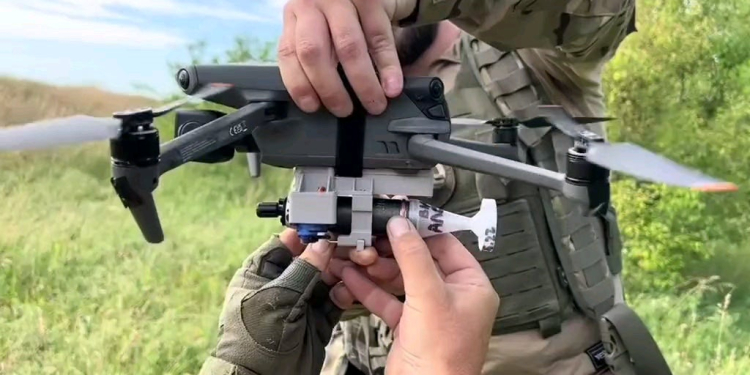Russia’s defense ministry said the country’s air defenses shot down 18 Ukrainian rockets.
Vyacheslav Gladkov, the governor in Belgorod, said on Telegram there was some damage to homes in several villages, and that at least one person was hurt.
Belgorod, located along the border between Russia and Ukraine, is a frequent target of Ukrainian attacks as Ukraine seeks to defeat the invasion Russia launched more than two years ago.
Ukraine’s military said it shot down 10 of the 13 Russian drones, with intercepts taking place over the Kharkiv, Sumy and Kyiv regions.
Ukrainian President Volodymyr Zelenskyy announced late Tuesday changes to his national security team.
Zelenskyy said in his nightly address that Oleksiy Danilov, the secretary of Ukraine’s national security council, had been replaced by Oleksandr Lytvynenko, who formerly led Ukraine’s foreign spy agency.
Zelenskyy called the change part of a “reboot of our state’s governance system.”
“In general, I expect strengthening of the strategic capabilities of our state to predict and influence the processes on which the national security of our country depends,” Zelenskyy said.
Ukraine said Tuesday it destroyed 12 Russian drones that targeted several Ukrainian regions, while Russia said it thwarted Ukrainian air attacks against the Belgorod region along the border between the two countries.
Ukraine’s air force said the country’s air defenses downed the drones over the Mykolaiv and Kharkiv regions.
Oleh Syniehubov, the regional governor in Kharkiv, reported on Telegram there was damage to a building, but no casualties.
Vitaliy Kim, the governor in Mykolaiv, said on Telegram three of the drones were destroyed above his region. He did not report any damage or casualties.
General: Germany to hand over 10,000 artillery shells to Ukraine in coming days
Germany will hand over 10,000 artillery rounds from its own military stocks to Ukraine in the next coming days, German General Christian Freuding said in an interview with Deutsche Welle (DW) published on March 27.
Ukraine has been facing increasingly severe ammunition shortages, namely due to delays in U.S. assistance caused by disputes in Congress. The lack of shells already had a direct impact on the ground, contributing to the loss of the key front-line city of Avdiivka.
Berlin unveiled a 500-million-euro ($540 million) package, including the 10,000 shells, earlier this month.
Freuding, who coordinates aid for Ukraine at the German Defense Ministry, said this batch is only the first of three stages of expected deliveries to Kyiv.
In the second phase, Berlin agreed to finance the purchase of 180,000 shells through the Czech initiative, the general noted. Prague announced last month that it had identified 800,000 shells abroad that could be bought and sent to Ukraine if other partners provide the necessary funding.
In the final, long-term stage of the plan, Germany entered into a bilateral agreement with an unnamed country to supply Ukraine with roughly 100,000 rounds starting in the last quarter of 20024, according to Freuding.
Initially a hesitant partner, Berlin has become Ukraine’s second-largest military donor after the U.S. According to the Kiel Institute for the World Economy, Germany has supplied Ukraine with 17.7 billion euros (around $19 billion) in military assistance as of January.
Bloomberg: US in talks with Turkey for more explosives to boost shell production
The U.S. is negotiating to increase purchases of explosives from Turkey to boost the production of artillery shells amid allies’ efforts to provide Ukraine with ammunition, Bloomberg reported on March 27, citing unnamed officials familiar with the matter.
Ukraine is facing critical shell shortages, as $60 billion in funding from the U.S. remains stuck in Congress. Delays in military assistance have already had a direct impact on the battlefield, contributing to the loss of the key front-line city of Avdiivka.
Turkish supplies of trinitrotoluene (TNT) and nitroguanidine, which is used as fuel, would be “crucial” in the production of NATO-standard 155 mm shells and could potentially triple production, sources told Bloomberg.
The production lines of the Turkish defense company Repkon are expected to produce about 30% of all U.S.-made 155 mm artillery ammunition by 2025, according to Bloomberg.
The Pentagon also purchased 116,000 rounds of ammunition from the Turkish company Arca Defense for deliveries this year, with further purchases expected next year, the news agency’s sources said.
Unnamed Western officials told Bloomberg that ammunition production in the U.S. and Europe could “significantly increase” in 2025 and the year after as major defense companies and smaller suppliers start to ramp up production.
Russia is producing close to 250,000 artillery munitions monthly, or around 3 million per year, which is nearly three times as many artillery munitions as the U.S. and Europe can send to Ukraine, CNN reported, citing NATO intelligence estimates and unnamed sources familiar with the matter.
Some information for this report came from Reuters, Kyiv Post, Bloomberg .































Discussion about this post